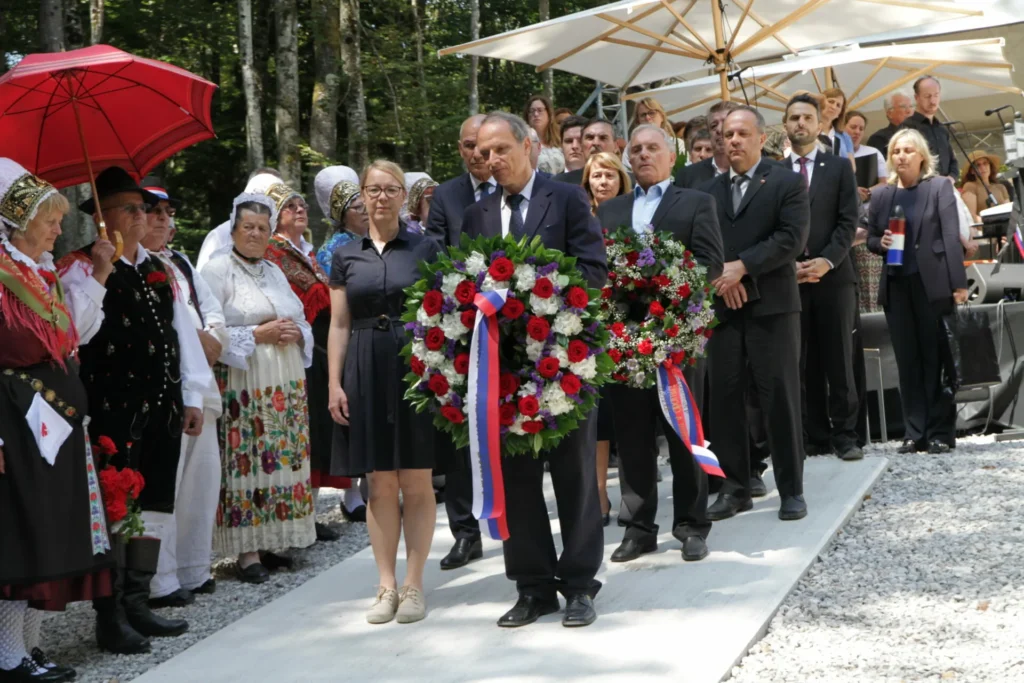Prime Minister Robert Golob celebrated the 80th anniversary of the repatriation of exiles and refugees to their homeland in Brestanica and drew attention to the realisation that war is evil. While condemning Nazism and fascism, he again avoided condemning the revolutionary violence of the communist authorities, which shows that the current authorities are not in favour of reconciliation of the Slovenian nation, but of continuing the schism.
While they are constantly trying to convince us that they are concerned about freedom, respect for human rights, human dignity and morality, they are enthusiastically attending partisan celebrations where ideology is in the foreground. In this way, we are further distancing ourselves from Europe, which, unlike us, is capable of condemning all totalitarianism.
During the Second World War, the German occupier exiled more than 63,000 Slovenians from Slovenia. As a larger group of Slovenians was exiled from Slovenska Bistrica on the 7th of June 1941, the Association of Exiles of Slovenia (Društvo izgnancev Slovenije) commemorates the Day of the Slovenian Exiles every year on the 7th of June, as a memorial and reminder of the expulsion. While the government coalition tabled “a bill on lump-sum compensation for war damage to property created in the Second World War, which would pay 8,000 euros in four annual instalments of 2,000 euros to beneficiaries with recognised status as victims of war violence, which includes exiles”, victims of post-war killings continue to be left without a grave, and the current government has even gone so far as to abolish the national day of commemoration for the victims of communist violence after taking power.
If the left-wing political pole truly believed that all citizens are equal, the Prime Minister and other government representatives would not have been absent from the commemorative ceremony on Sunday, marking the 80th anniversary of the mass post-war massacres at the Macesnova gorica massacre site in Kočevski Rog, where the President of the Slovenian Bishop’s Conference and Bishop of Novo mesto, Andrej Saje, pointed out the need for a proper burial of the victims and for clear condemnations of the crimes.
The wounds are not healed
According to the Slovenian Press Agency (STA), at the traditional ceremony organised by the New Slovenian Association (Nova Slovenska zaveza), Saje pointed out that 80 years after the end of World War II, the wounds caused by the war have not yet been healed. This, he said, is because “these wounds have never really been tended to due to historical circumstances, lack of appropriate will and absence of necessary actions”. “The crimes of revolutionary violence have not been condemned, the innocent killed have not been exonerated, and their remains have not been buried – and all of this has been true now for an unreasonable length of time,” he said critically, calling for a proper burial for those killed after the war.
No reconciliation without truth, acknowledgement of guilt, and forgiveness
According to Saje, every burial and grave is a recognition and expression of human dignity. Reconciliation seems necessary to him, but it cannot happen without truth, acknowledgement of guilt, and forgiveness. “Today, we therefore once again call on those in power to do what is right. This means to clearly and publicly condemn the crimes that took place here, to wash the stain from the memory of those who were innocently killed, and to ensure a dignified burial for these victims,” he said, identifying Ljubljana’s Žale cemetery as the most appropriate location for the burial.
Saje also stressed the importance of overcoming divisions and schisms that are a burden to us. He expressed his wish that the pain of the dead should be “a foundation for building reconciliation that transcends resentments and ideological trenches”. “In the memory of suffering and loss, may we be guided by courage for peace, for mutual respect and for renewed confidence in a common future,” he said, adding that this will enable us to walk the path of true reconciliation. Reconciliation, he stressed, is not about forgetting everything, “but the courageous acknowledgement of the truth, and the power of forgiveness is greater than that of revenge.”
The choir of descendants of political emigrants who had to leave their homeland in 1945 and went to Argentina sang at the Mass and in the cultural programme, and the President of the New Slovenian Association, Matija Ogrin, also performed. Wreaths were laid at the empty abyss by representatives of the New Slovenian Alliance, the Slovenian Democratic Party (Slovenska demokratska stranka – SDS), the New Slovenia party (Nova Slovenija – NSi), the Municipality of Kočevje and Croatian representatives, according to the newspaper Družina. For the first time after quite a few years, there were no representatives of the state present at the commemoration, nor was the Slovenian Armed Forces honour guard present. The President of the Republic did not respond to the invitation to come to the traditional commemorative ceremony organised by the actual representatives of the murdered, but rather went to a separate ceremony held the previous week.
However, the SDS party leader and the Prime Minister of the previous government, which had established a national day of commemoration for the victims of communist violence to mark the importance of commemorating the victims of communism, was not absent from the ceremony. On this occasion, Janez Janša reminded everyone on the social network X that a dignified burial is a basic civilisational norm that every deceased person deserves. Therefore, he said, the time has come to finally guarantee the right of remembrance for the murdered and their families. “It is time to condemn all the crimes that have been committed on our soil, including the crimes of communism,” he said, adding that remembrance, truth and reconciliation are the cornerstones of our common good future.
A. H.


